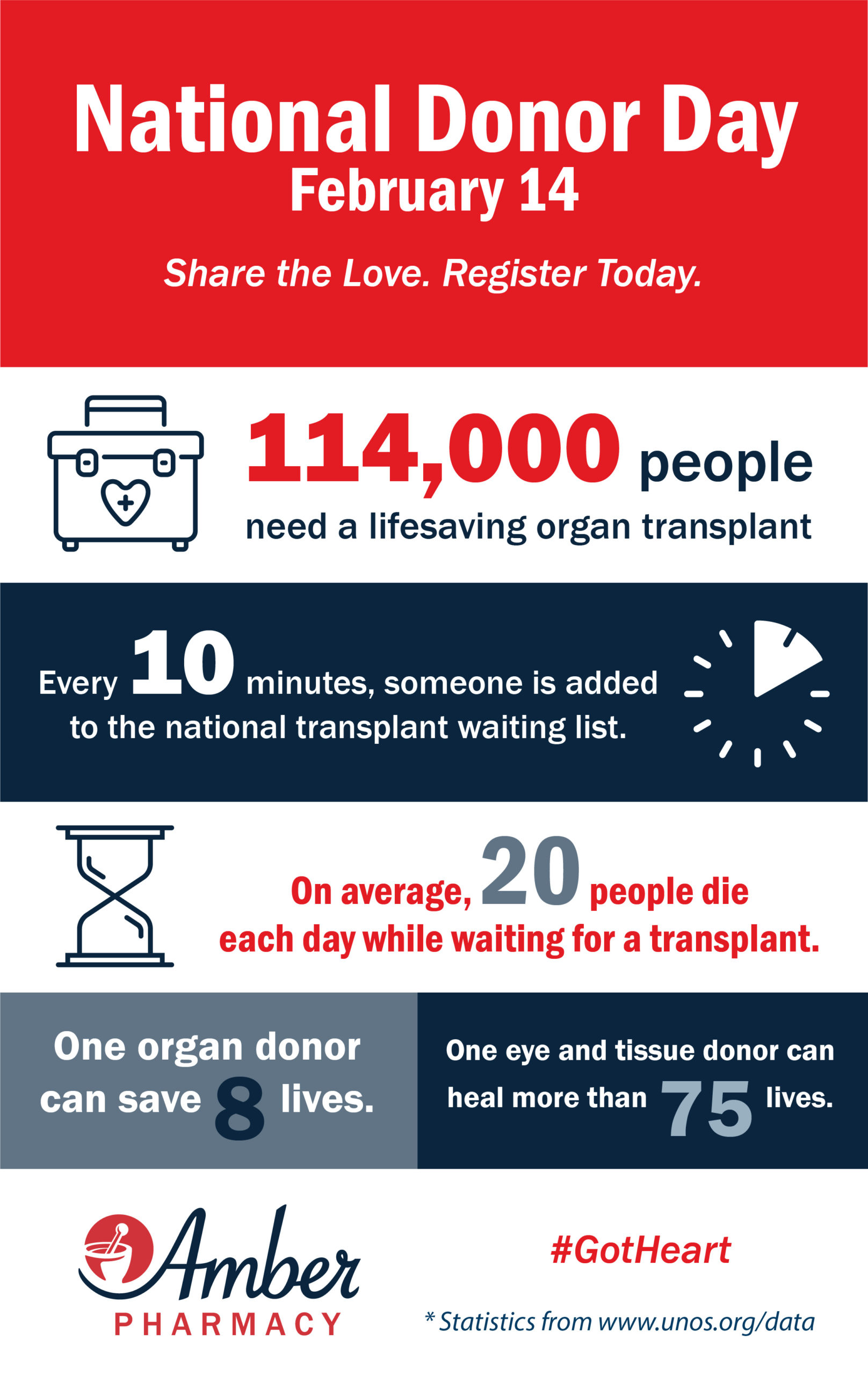Important Updates To Medicare: A Message To Pat...
Blog
Celebrate National Donor Day on February 14, 2019
- February 14, 2019
- Amber Specialty Pharmacy
- Transplant

On a day that most people recognize for sharing valentines with their loved ones, it is also a day that we learn about sharing the gift of life with those in need of organ and tissue donations. February 14 is National Donor Day, which was originally designated in 1998 by the U.S. Department of Health and Human Services to raise awareness for organ, eye, tissue, marrow, platelet and blood donation.
On average, more than 114,000 people are on the transplant list. Unfortunately, only about a third of those people will receive an organ transplant in the course of a year.* One of the major goals of National Donor Day is to increase this number by encouraging more people to consider donating their organs and to take steps now to make sure their wishes are followed if and when the time comes.
Deceased Organ and Tissue Donation
Most often, donors are deceased and can donate kidneys, lungs, liver, heart, pancreas and intestines. In 2014, hands and faces were added to the transplant list. In addition to major organs, tissues can also be donated, including corneas, skin, bone and tendons. As a tissue donor, you can enhance the lives of up to 50 people.**
One of the most important steps you can take to become an organ and tissue donor is to discuss your decision to donate with your family. This gives them peace of mind and makes it easier for them during a difficult time.
You can sign up to be a donor on state and national registries. Most states offer this option when you renew your driver’s license – just check a box when you visit the Department of Motor Vehicles. You can also sign up by going to the Donate Life America website and filling out a simple form. You never need to re-enroll or remove yourself if your health condition changes, but you can update or remove your registration at any time. At the time of your death, doctors will determine what organs, if any, you’re able to donate.
Living Organ Donation
Living donors can donate one of their kidneys or a portion of their liver. If you are considering this option, you should learn everything you can about the process, and discuss with your doctor, transplant experts and other advisors. After making the decision to donate, you will go through extensive health screenings and consultations.
A kidney donation involves a minimally invasive surgery that leaves small incisions. For a liver donation, a section is removed and the liver regenerates to its normal size within a few months. Most people spend 2 to 7 days in the hospital to recover and can return to normal activities within a couple of months. You will have a few follow-up appointments to ensure everything is healing well.
Marrow, Blood and Platelet Donations
Bone marrow is the soft tissue found in the interior cavities of bones and is where blood cell production occurs. The most common recipients are cancer patients who have gone through chemotherapy and can no longer produce enough healthy blood cells. The patient and donor must have closely matched tissue and blood types, and a donation will not occur until a match is found. The donation is typically an outpatient procedure done under general anesthesia.
If you want to be listed as a potential marrow donor, you must be a healthy adult, age 18-60. You can register online at bethematch.org, and you will receive a cheek swab kit which will determine your tissue type.
Blood and platelet donations are much simpler and are something that almost any healthy adult can do. Blood is stored in a blood bank according to type and can be used whole or separated into plasma and platelets, which all have different life-saving uses. It only takes about an hour to collect a pint of blood, including testing and screening, and you can donate blood once every 56 days. To schedule a donation, contact your local blood donation organization, such as the Red Cross.
Amber Specialty Pharmacy is Here to Help
Our team of pharmacists, enrollment and benefit coordinators and personal care coordinators are here to answer any questions you have about the transplant process. We have 20 years of experience with transplant, working with over 200 transplant facilities nationwide. At Amber Specialty Pharmacy, we’re always here to help.
*Mayo Clinic: https://connect.mayoclinic.org/page/transplant/newsfeed/national-donor-day-celebrating-the-gift-of-life/#
** U.S. Department of Health and Human Services:



